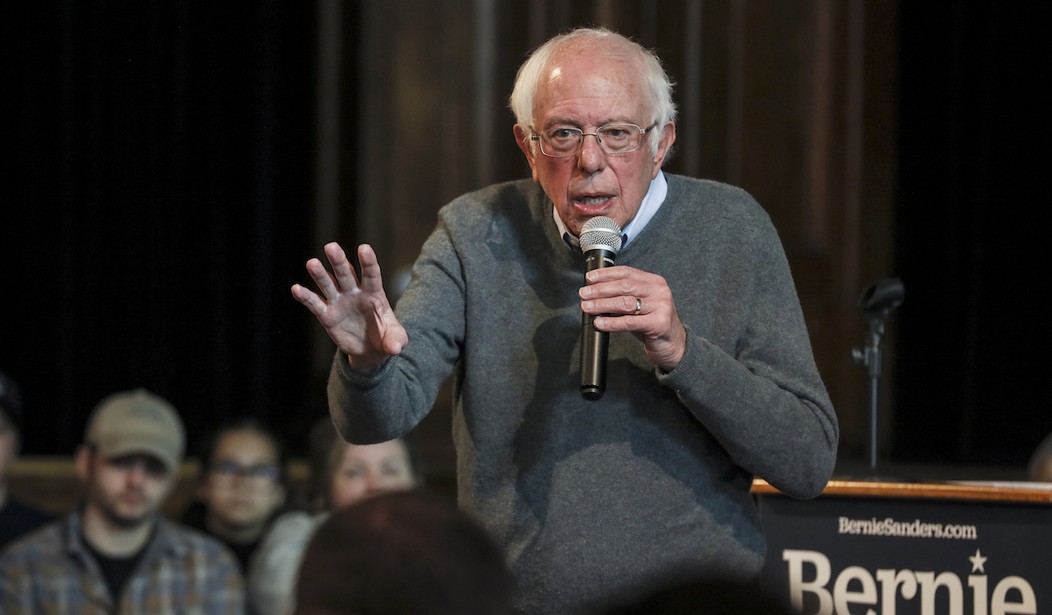The old becomes the new. It's less than a week from the Iowa caucuses, and Bernie Sanders, born in September 1941, three months before Pearl Harbor, leads the RealClearPolitics average of recent polls by 4 points in Iowa, 10 points in New Hampshire, and 5 points in the biggest delegate prize, the Super Tuesday-voting California.
One hastens to add: The Sanders surge, like the Elizabeth Warren warming period from mid-September to mid-November and the Pete Buttigieg bump in December, may not last.
Old-timers may remember when Sanders' fellow Vermonter Howard Dean, fierce critic of the Iraq war, was leading the field going into Iowa and New Hampshire in 2004 -- and came out of the Iowa contest far behind front-runners John Kerry and John Edwards, and out of New Hampshire far behind Kerry.
That year, Democrats decided Kerry's military record made him more electable against George W. Bush. This month, multiple polls suggest Democrats are moving away from electability and toward candidates who express their own views. That's especially true of young Democrats, who are heavily for Sanders, who leads Joe Biden among voters under 35 53% to 3% in the latest Quinnipiac poll.
The Democratic Party, the oldest political party in the world, has always been a coalition of out-groups, people who are somehow not considered typical Americans but together can form a majority. This is true even in Iowa, where the generational divide is vivid: An Emerson College/7 News poll, for example, shows Biden with 32% of voters over 50 and Sanders with 44% of those below 50.
White college grads, here as elsewhere, have been shopping around. Upscale Democrats in October and early November seemed inclined toward Warren's "I have a plan for that." Then, perhaps proud of Americans' widening acceptance of LGBT equality, from mid-November to year-end, they put Buttigieg in the lead. Perhaps they'll switch again.
Recommended
Iowa's caucus rules tend to overreward the two or three candidates leading in polls and ruthlessly underreward those with less backing. In each of the 1,678 caucus sites in the state's 99 counties, plus the 99 satellite sites in other states, Scotland, France and (for reasons unclear to me) Tblisi, Georgia, caucusgoers must declare their choice after listening to pitches for candidates. But if their candidate doesn't get 15%, they are declared "unviable," and their supporters can join with others to augment their support or make them viable.
The theory is that conscientious Iowans, after months of retail politics, will make well-informed judgments of character. Maybe so, but in 2004 and 2008, Iowa Democrats gave strong second-place finishes to the political fraudster John Edwards. Sanders finished an even closer second in 2016, when he may have actually had more voters than Hillary Clinton. Iowa Democrats have always counted the results by state convention delegate equivalent; this year they also promise a headcount of the human beings voting for each candidate.
If current polls are right and opinion doesn't change, Sanders and Biden both seem likely to come out of Iowa with plenty of delegates. Buttigieg, Warren and Minnesota neighbor Amy Klobuchar are at risk of running well behind if they don't make the 15% threshold and are, therefore, ruled unviable in hundreds of caucus precincts.
New Hampshire seems easier to predict, unless Sanders goes out of the running in Iowa. Its population is relatively upscale, and the creeping Vermontification of at least its Democrats, spreading east from the Connecticut River and west from woke Portsmouth, is almost complete. New Hampshire's once-stout resistance to tax increases has weakened among Democrats, and voters here generally in the 20th-century birthplace of the state lottery take a laissez-faire view on cultural issues.
So it's not surprising that in 2016, Sanders carried every city, town, township, grant, gore, purchase and location except three lightly populated units in the north and -- presumably, in response to his support of high tax rates -- the state's three highest-income suburbs, Bedford, Windham and New Castle. His increasing lead in New Hampshire polls this month suggest he's on the brink of a similar win in February.
Sanders wins in Iowa and New Hampshire would make him hard to stop. Biden's current national and Nevada poll leads could vanish overnight. His candidacy would depend on heavy support from blacks in the Deep South and industrial north.
Democratic professionals who fear that Sanders' liabilities -- age, socialism -- are too much to overcome may find it as difficult to defeat him as their Republican equivalents found it difficult to stop Donald Trump four years ago. Or as difficult as it was for Britain's New Labour establishment to stop the left-wing Jeremy Corbyn from leading the party to a record defeat last month.
Michael Barone is a senior political analyst for the Washington Examiner, resident fellow at the American Enterprise Institute and longtime co-author of The Almanac of American Politics.

























Join the conversation as a VIP Member